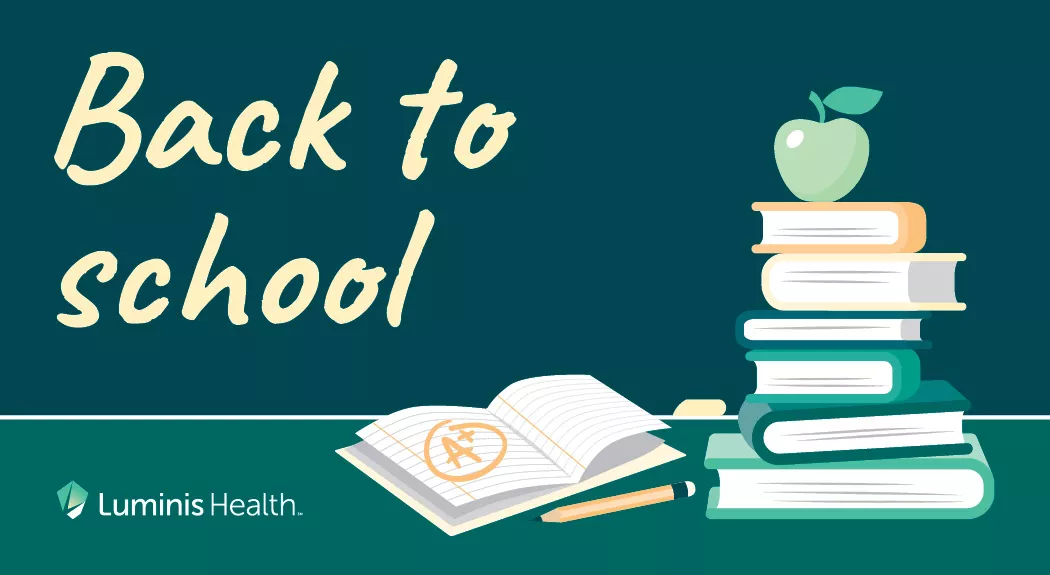Effective January 20, 2026, masks are encouraged for all staff, patients and visitors at all Luminis Health locations and will remain encouraged through the end of the influenza season. Thank you for your patience as we continue to care for our community.

The days are growing shorter and there is a hint of fall in the air. It can only mean one thing: It’s almost time to go back to school! Summer’s less structured schedule and more unpredictable rhythms can make it a bit of a bumpy road for both parents and children as they get back into the learning groove. Here’s a pediatrician-recommended checklist of items to help make the return to school a healthier and more pleasant experience for kids and their parents, too.
Importance of Sleep Routine
Routines and schedules are important for children, especially when it comes to sleep. A week or two before school starts, slowly adjust your child’s bedtime until it is back to its regularly scheduled time for school nights. For example, have your child wake up 15 minutes earlier and go to sleep 15 minutes earlier until you find the right balance. Begin this process early—don’t wait until a couple of nights before the first day of school. Well-rested brains are ready to learn and grow.
Vision Screenings and Eye Exams
While basic eye tests are common at school, it’s also recommended that your child see an optometrist or pediatric ophthalmologist, preferably at the beginning of school. You may be surprised to learn that, squinting and straining to see can cause headaches in school-aged children. These headaches can be fixed with a pair of glasses or contacts that are properly prescribed by an eye doctor. Vision is one of the most important learning tools for students.
Well-Child Check
A new school year is the perfect time to take your children to the doctor for a well-child check. Your healthcare provider will examine your child’s growth and development to find, treat, and in some cases, prevent issues. You can also talk to the doctor about your child’s vaccinations. Check out the American Academy of Pediatrics for a helpful recommended child and adolescent immunization schedule and for guidance, including answers to many of your questions.
Healthy Meals
Whether your child is eating lunch at school or bringing their own, you should educate students about the importance of eating fruits and vegetables, as well as protein such as cheese, meat or peanut butter. Beans are an excellent source of nutrition and can be added to many meals. While we all love and want to eat foods like chips and fries, they should be saved for special occasions—not daily or the main course. Another good tip? Avoid drinking fruit juice and soda. Water is healthier because it increases energy, relieves fatigue, and has no calories! Nutritious snacks and meals, especially breakfast, help ensure your child is ready to focus and learn at school.
Back-to-School Jitters
It is normal and natural for a new school year—or a new school—to cause your child to experience some anxiety. Parents and guardians should acknowledge their child’s anxiety and talk openly about it. Visiting the school before the year begins, rehearsing drop-off, and spending time on the playground or inside your child’s classroom can be helpful ways to calm anxiety and soothe your child’s concerns. Keep in mind that children can sense your anxiety—so do your best to stay calm and supportive.
In Conclusion
A new school year should be an exciting, not a scary or stressful time. Your child’s pediatrician is available to work with you to make sure your children have a successful school year. We hope you found these tips helpful. One last one: encourage regular handwashing, as germs are plentiful in classrooms! Small bottles of hand sanitizer are a good addition to every backpack.
Asha S. Payne, MD MPH, is a board-certified pediatric emergency medicine physician at Children’s National Hospital. Physicians from Children’s National provide pediatric emergency and urgent care at Luminis Health Doctors Community Medical Center (LHDCMC) seven days a week from 1-11 PM.*
*Children who come to LHDCMC’s ER outside of Children’s National staff hours are seen by Luminis Health emergency providers.



